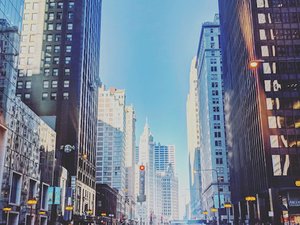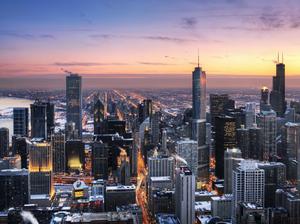
About 1,800 older adults die from falls in nursing homes every year, and about 10 percent to 20 percent of all nursing home falls cause serious injuries, according to the Center for Disease Control.
A team of Northwestern alums wants to prevent those falls, as well as create a system that can monitor and potentially identify what is causing health problems among older adults.
Their product is called Luna Lights-- a system of a bed sensor, mountable lights, and data analysis that can keep track of when seniors get up at night and provide light that can guide seniors away from dangerous obstructions. The system replaces the current methods of keeping track of falls at night-- one of the most common and dangerous times for falls-- which is largely done through caregivers doing rounds and checking on individual residents. Their solution comes just as the bulk of aging baby boomers are starting to head into old age, and the workload on caregivers increases.
The Luna Lights system is a thin bed sensor that is put on a senior's mattress. When a senior gets up from bed in the middle of the night
(often to go to the bathroom), the sensor turn ons the mountable lights, creating a guided path. The system also notes when a senior gets up and how long they are gone. That data is also tracked over time and fed to an online dashboard, where it can be analyzed to see if patterns in nighttime activity could be indicative of a larger health problem.
For each system there is a one time $150 installation fee that includes a sensor and three lights, and a $30 monthly fee for data analysis. The system is patent pending.
The idea came to cofounders Matt Wilcox, Donovan Morrison, and Wesley Youman, all engineering students at Northwestern, while at a summer program run through the university called "Design For America." The program asks an interdisciplinary group of students to design solutions to social problems. The Luna Lights team gravitated toward the goal of decreasing falls in senior living homes because they all had grandparents who had suffered preventable falls.
"We were really just seeing what a huge impact what falls had on our grandparents and our extended family," said Morrison, Luna Lights' CEO.
The team said they spent significant time in senior living homes researching the current methods and solutions. They found that the majority of the most risky falls tend to happen at night, as caregivers don't have a way to know that a resident has fallen unless they hear them yell through a door. Other solutions on the market include wearables, which can have low compliance at night when it is most important (i.e. a senior may take off wearable tech in bracelet or necklace form for comfort's sake), and motion sensor systems, which can be expensive, too technical to manage, and have a "big brother" feel that doesn't hold much appeal, Morrison said.
With that in mind, they designed a system they hoped would be unobtrusive and have high compliance. This spring they tested Luna Lights with six residents at Mather Lifeways in Evanston. They described the experience as a "huge success" given that residents actually wanted to use the system-- largely it gave them some control over their health, said Morrison. "It was pretty validating to see how much the residents enjoyed using the product."
They haven't just seen success amongst seniors however. Last year they went through Healthbox's accelerator (they currently work out of affiliated Sandbox Industries offices), and won the Aging 2.0 pitch competition in Washington DC. Last month the team took home $30,000 in funding from Northwestern's Venture Challenge. On June 30, Morrison will be pitching at Technori, while Wilcox is pitching at the Boomer Venture Summitbusiness plan competition in Silicon Valley. Later in July they will start their second, larger pilot at Presbyterian Homes in Lake Forest, and already five senior living communities are confirmed for paid model in 2015.
With the baby boomer generation set to be one of the largest populations entering the senior living space, Wilcox and Morrison said it was more important for them than ever before create solutions in an industry that hasn't seen much innovation despite the tech boom that seems to have revolutionized pretty much everything else.
"We are really excited we are young and in [this] space," said Wilcox. "We both had personal experience and personal connections that are driving our passion for it. Our vision as a company is influenced by that passion."








